- B1-B2 grammar

Reported speech: questions

Do you know how to report a question that somebody asked? Test what you know with interactive exercises and read the explanation to help you.
Look at these examples to see how we can tell someone what another person asked.
direct speech: 'Do you work from home?' he said. indirect speech: He asked me if I worked from home. direct speech: 'Who did you see?' she asked. indirect speech: She asked me who I'd seen. direct speech: 'Could you write that down for me?' she asked. indirect speech: She asked me to write it down.
Try this exercise to test your grammar.
Grammar B1-B2: Reported speech 2: 1
Read the explanation to learn more.
Grammar explanation
A reported question is when we tell someone what another person asked. To do this, we can use direct speech or indirect speech.
direct speech: 'Do you like working in sales?' he asked. indirect speech: He asked me if I liked working in sales.
In indirect speech, we change the question structure (e.g. Do you like ) to a statement structure (e.g. I like ).
We also often make changes to the tenses and other words in the same way as for reported statements (e.g. have done → had done , today → that day ). You can learn about these changes on the Reported speech 1 – statements page.
Yes / no questions
In yes / no questions, we use if or whether to report the question. If is more common.
'Are you going to the Helsinki conference?' He asked me if I was going to the Helsinki conference. 'Have you finished the project yet?' She asked us whether we'd finished the project yet.
Questions with a question word
In what , where , why , who , when or how questions, we use the question word to report the question.
'What time does the train leave?' He asked me what time the train left. 'Where did he go?' She asked where he went.
Reporting verbs
The most common reporting verb for questions is ask , but we can also use verbs like enquire , want to know or wonder .
'Did you bring your passports?' She wanted to know if they'd brought their passports. 'When could you get this done by?' He wondered when we could get it done by.
Offers, requests and suggestions
If the question is making an offer, request or suggestion, we can use a specific verb pattern instead, for example offer + infinitive, ask + infinitive or suggest + ing.
'Would you like me to help you?' He offered to help me. 'Can you hold this for me, please?' She asked me to hold it. 'Why don't we check with Joel?' She suggested checking with Joel.
Do this exercise to test your grammar again.
Grammar B1-B2: Reported speech 2: 2
Language level
Hello, dear teachers and team!
Could you please help me with the following:
- She asked me "Does the Earth turn around the Sun?"
Does it have to be: "She asked me if the Earth TURNED around the Sun" ?
Do we have to change the question into the past form here as well?
2. She asked: "Was coffee originally green"?
Is "She asked me if the coffee HAD BEEN originally green" correct option? Can I leave WAS in an inderect speech here?
3. Is "She asked me if I knew if the Sun IS a star" or "She asked me if I knew if the Sun WAS / HAD BEEN a star" (if any) correct?
I'm very very grateful for your precious help and thank you very much for your answering this post in advance!!!
- Log in or register to post comments
Hello howtosay_.
1. She asked me "Does the Earth turn around the Sun?" Does it have to be: "She asked me if the Earth TURNED around the Sun" ?
No, you can use the present here as well. The verb for this context would be 'go' rather than 'turn':
She asked me if the earth goes around the sun.
She asked me if the earth went around the sun.
Do we have to change the question into the past form here as well? 2. She asked: "Was coffee originally green"? Is "She asked me if the coffee HAD BEEN originally green" correct option? Can I leave WAS in an inderect speech here?
You can use either 'had been' or 'was' here. The adverb 'originally' removes any ambiguity.
3. Is "She asked me if I knew if the Sun IS a star" or "She asked me if I knew if the Sun WAS / HAD BEEN a star" (if any) correct?
You can use 'is' or 'was' here but not 'had been' as that would suggest the sun is not a star any more.
The LearnEnglish Team
She offered me to encourage studying English. She asked us if we could give her a hand.
He said, "I wished she had gone."
How to change this sentence into indirect speech?
Hello bhutuljee,
'He said that he wished she had gone.'
Best wishes, Kirk LearnEnglish team
He said, "I wish she went."
How to change the above sentence into indirect speech?
Hi bhutuljee,
It would be: "He said that he wished she had gone."
LearnEnglish team
He said , "She wished John would succeed."
This is the third sentence you've asked us to transform in this way. While we try to offer as much help as we can, we are not a service for giving answers to questions which may be from tests or homework so we do limit these kinds of answers. Perhaps having read the information on the page above you can try to transform the sentence yourself and we will tell you if you have done it correctly or not.
Hi, I hope my comment finds you well and fine. 1- reported question of "where did he go?"
Isn't it: She asked where he had gone?
https://learnenglish.britishcouncil.org/grammar/b1-b2-grammar/reported-…
2- how can I report poilte questions with( can I, May I) For example: She asked me" Can I borrow some money?"
Your reply will be highly appreciated.
Online courses

Group and one-to-one classes with expert teachers.

Learn English in your own time, at your own pace.

One-to-one sessions focused on a personal plan.

Get the score you need with private and group classes.
Reported Questions
Reported questions are one form of reported speech .
We usually introduce reported questions with the verb "ask":
- He asked (me) if / whether ... (YES/NO questions)
- He asked (me) why / when / where / what / how ... (question-word questions)
As with reported statements , we may need to change pronouns and tense (backshift) as well as time and place in reported questions.
But we also need to change the word order . After we report a question, it is no longer a question (and in writing there is no question mark). The word order is like that of a normal statement (subject-verb-object).
Reported YES/NO questions
We introduce reported YES/NO questions with ask + if :
Note that in the above example the reported question has no auxiliary "do". But there is pronoun change and backshift.
Note that we sometimes use "whether" instead of "if". The meaning is the same. "Whether" is a little more formal and more usual in writing:
- They asked us if we wanted lunch.
- They asked us whether we wanted lunch.
Reported question-word questions
We introduce reported question-word questions with ask + question word :
Note that in the above example the reported question has no auxiliary "do". But there is pronoun change and backshift.
- YES/NO questions: Do you want tea?
- Question Word questions: Where did you drink tea?
- Choice questions: Do you prefer tea or coffee?
Look at these example sentences:
Contributor: Josef Essberger
Reported Speech – Free Exercise
Write the following sentences in indirect speech. Pay attention to backshift and the changes to pronouns, time, and place.
- Two weeks ago, he said, “I visited this museum last week.” → Two weeks ago, he said that . I → he|simple past → past perfect|this → that|last …→ the … before
- She claimed, “I am the best for this job.” → She claimed that . I → she|simple present→ simple past|this→ that
- Last year, the minister said, “The crisis will be overcome next year.” → Last year, the minister said that . will → would|next …→ the following …
- My riding teacher said, “Nobody has ever fallen off a horse here.” → My riding teacher said that . present perfect → past perfect|here→ there
- Last month, the boss explained, “None of my co-workers has to work overtime now.” → Last month, the boss explained that . my → his/her|simple present→ simple past|now→ then
Rewrite the question sentences in indirect speech.
- She asked, “What did he say?” → She asked . The subject comes directly after the question word.|simple past → past perfect
- He asked her, “Do you want to dance?” → He asked her . The subject comes directly after whether/if |you → she|simple present → simple past
- I asked him, “How old are you?” → I asked him . The subject comes directly after the question word + the corresponding adjective (how old)|you→ he|simple present → simple past
- The tourists asked me, “Can you show us the way?” → The tourists asked me . The subject comes directly after whether/if |you→ I|us→ them
- The shop assistant asked the woman, “Which jacket have you already tried on?” → The shop assistant asked the woman . The subject comes directly after the question word|you→ she|present perfect → past perfect
Rewrite the demands/requests in indirect speech.
- The passenger requested the taxi driver, “Stop the car.” → The passenger requested the taxi driver . to + same wording as in direct speech
- The mother told her son, “Don’t be so loud.” → The mother told her son . not to + same wording as in direct speech, but remove don’t
- The policeman told us, “Please keep moving.” → The policeman told us . to + same wording as in direct speech ( please can be left off)
- She told me, “Don’t worry.” → She told me . not to + same wording as in direct speech, but remove don’t
- The zookeeper told the children, “Don’t feed the animals.” → The zookeeper told the children . not to + same wording as in direct speech, but remove don’t
How good is your English?
Find out with Lingolia’s free grammar test
Take the test!
Maybe later
- Reported Yes/No questions — Exercise 3
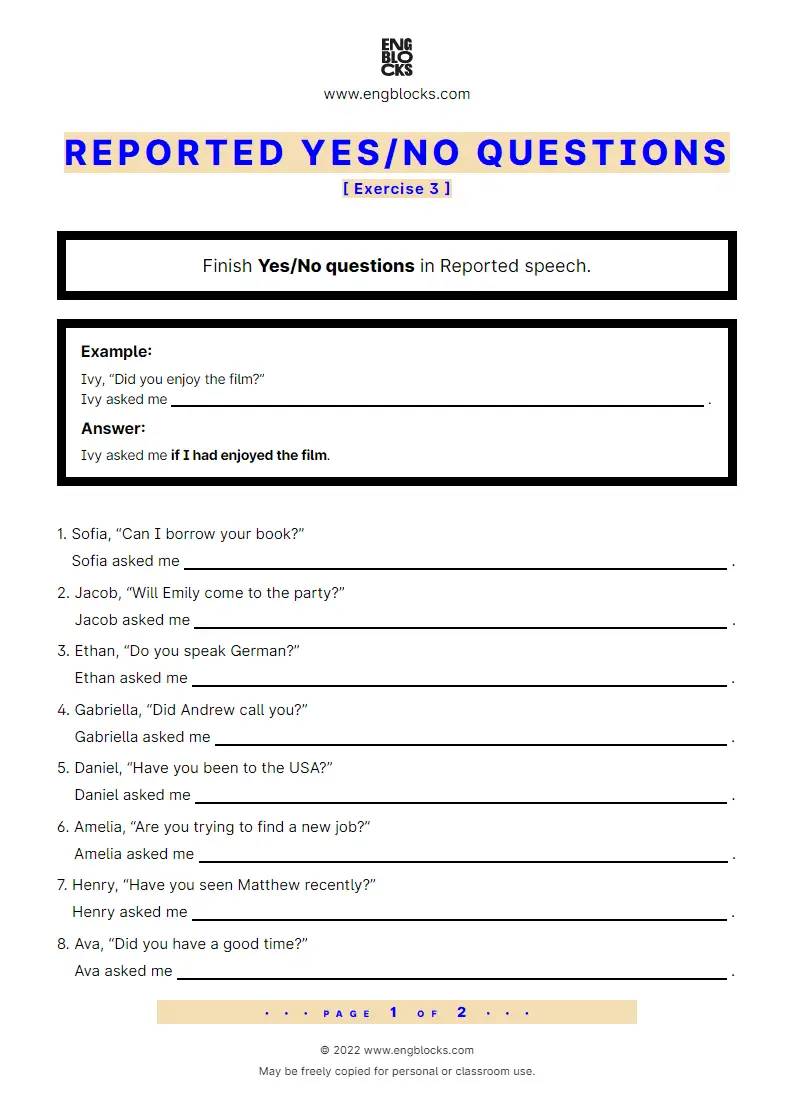
Reported statements — mixed tenses — Exercise 1
Task: Finish the sentences using Reported speech. Pay special attention to changing pronouns and time phrases where necessary.
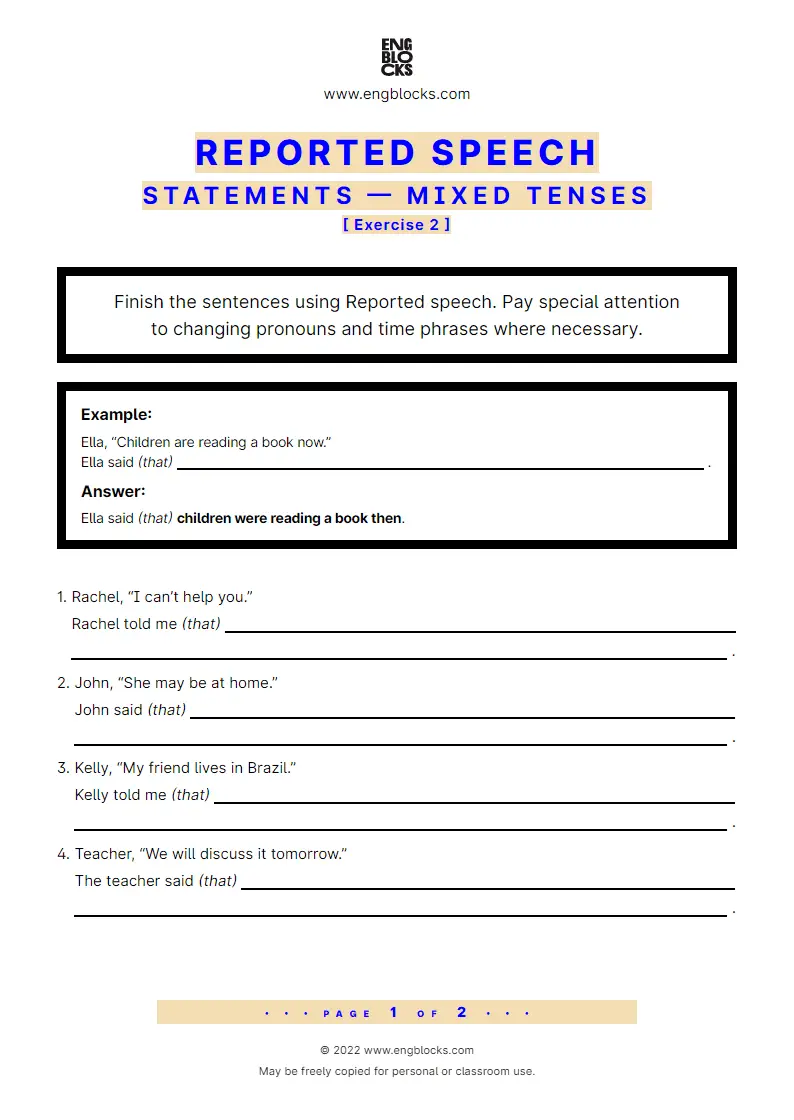
Reported statements — mixed tenses — Exercise 2
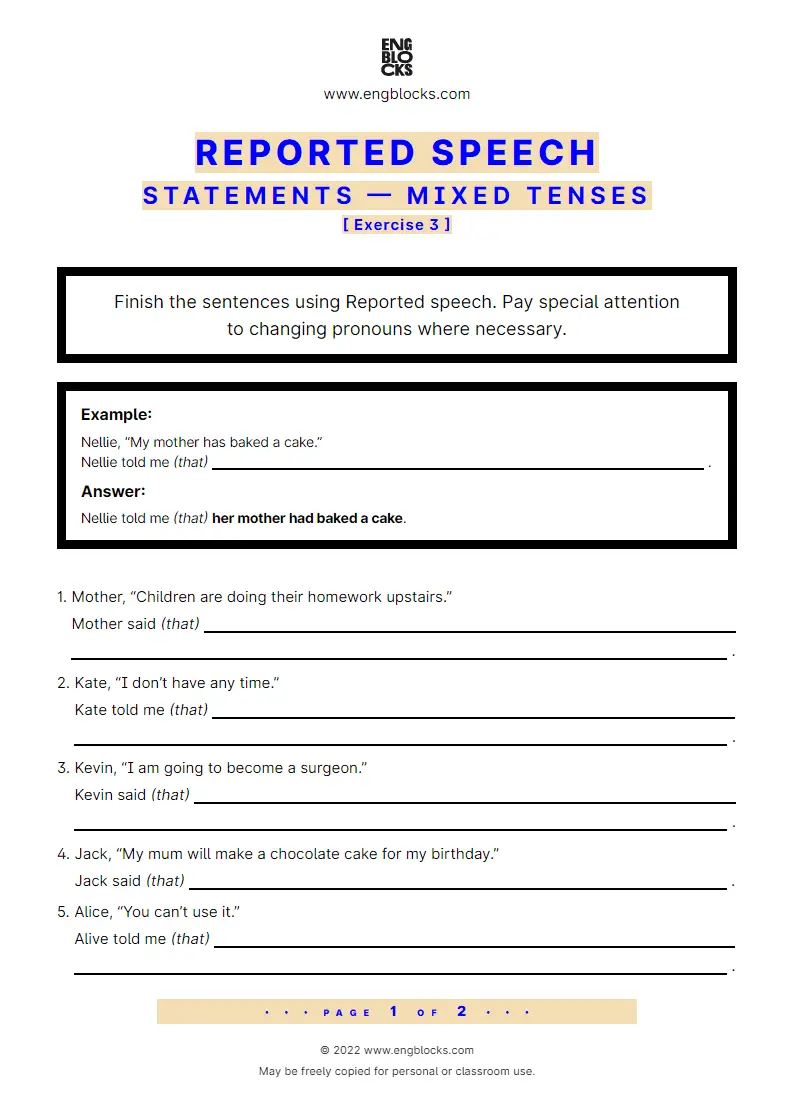
Reported statements — mixed tenses — Exercise 3
Task: Finish the sentences using Reported speech. Pay special attention to changing pronouns where necessary.
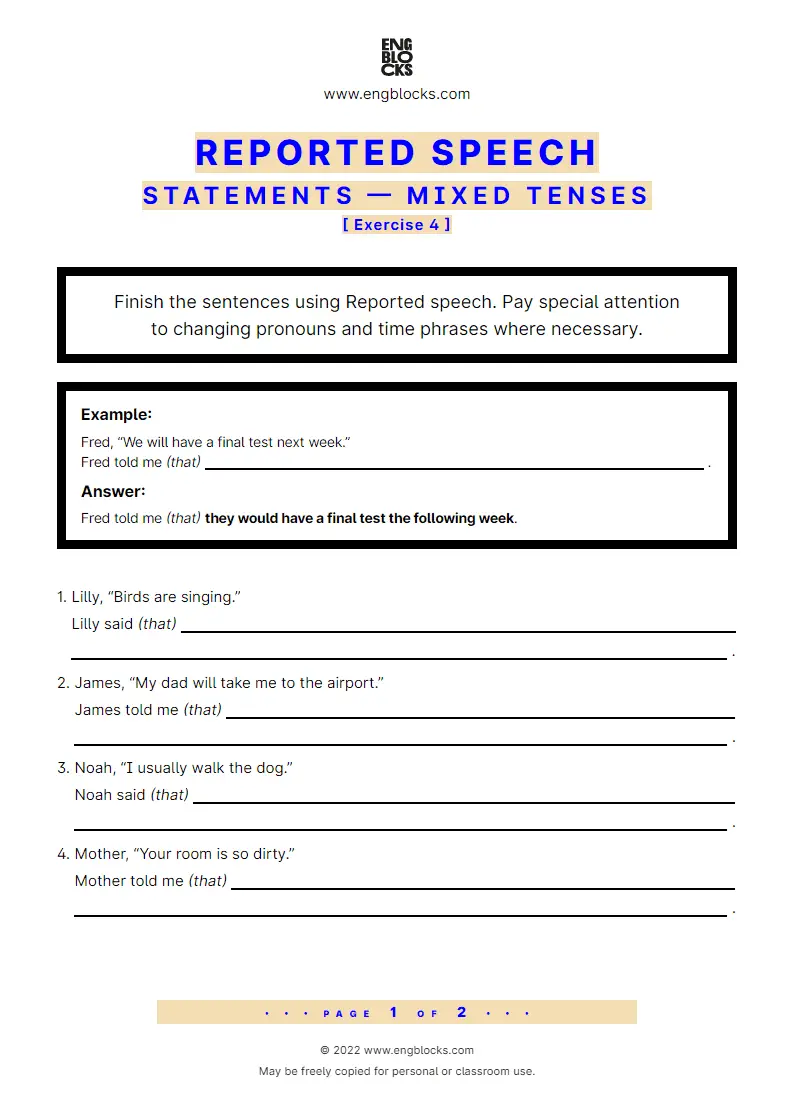
Reported statements — mixed tenses — Exercise 4
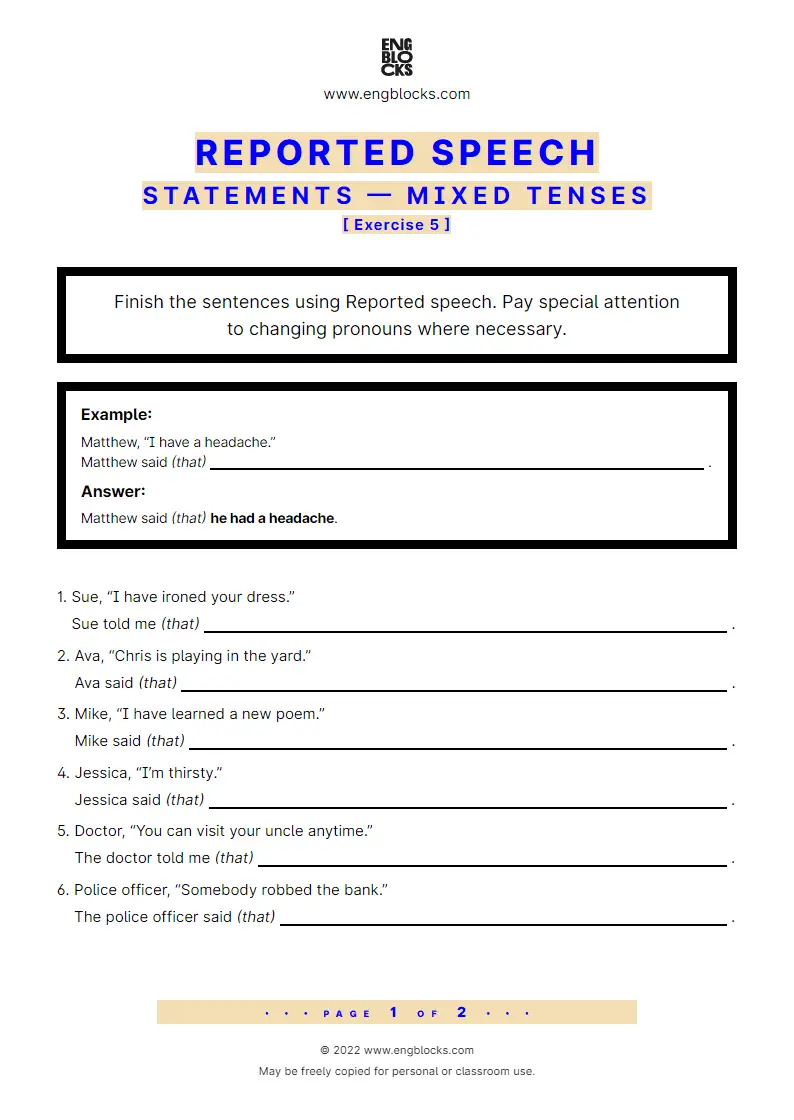
Reported statements — mixed tenses — Exercise 5

Reported speech - 1
Reported speech - 2
Reported speech - 3
Worksheets - handouts
Reported speech
Worksheets - pdf exercises.
- Reported statements - worksheet
- Worksheet - reported questions
- Reported yes/no questions
- Worksheet - reported speech
- Reported speech - exercises pdf
- Indirect speech - exercises
- Reported speech - exercises
- Mixed reported speech 1
- Mixed reported speech 2
- Reported speech 1
- Reported speech 2
- Reported speech 3
- Reported speech 4
- Reported speech 5
- Reported wh- questions
- Reported speech - worksheet
- Reported commands
- Reported questions
- Reported speech 1
- Reported speech 2
- Reported requests and orders
- Reported speech exercise
- Reported questions - worksheet
- Indirect speech - worksheet
- Worksheets pdf - print
- Grammar worksheets - handouts
Grammar - lessons
- Reported speech - grammar notes
- How to use reported speech - lesson
- Tense changes - grammar

Reporting Yes/No Questions | Class 10 Reported Speech Worksheet
Yes/no questions are reported with if or whether . Study the examples given below.
The boy asked his mother, 'Is there anything in the fridge?'
The boy asked his mother if there was anything in the fridge .
The teacher asked the students, 'Do you believe in ghosts?'
The teacher asked the students if they believed in ghosts.
Report the following questions.
1. She asked, 'Will you help me?'
2. The stranger asked, 'Do you know where Krishna lives?'
3. She asked, 'May I know the truth?'
4. She asked, 'Have you met my cousin Jay?'
5. The teacher asked the boy, 'Have you paid the fee?'
6. She asked me, 'Would you like to join us?'
7. 'Can you speak English?' the manager asked the candidate.
1. She asked me if I would help her .
2. The stranger asked me if I knew where Krishna lived .
3. She asked if she might know the truth .
4. She asked if I had met her cousin Jay .
5. The teacher asked the boy if he had paid the fee .
6. She asked me if I would like to join them .
7. The manager asked the candidate if he could speak English .
Sections in this article
Direct and indirect speech Rules for the change of pronouns Reporting verb Rules for the change of tenses Rules for the change of adverbs Reporting hopes, intentions and promises Reporting orders, requests and advice Reporting questions Reporting questions: grammar exercise Reported speech exercise Reporting Yes/No questions
Common mistakes in the use of nouns Common mistakes in the use of nouns | Exercise 1 Common mistakes in the use of nouns | Exercise 2 Common mistakes in the use of nouns | Exercise 3
More CBSE English Grammar worksheets
Enter your email address to receive our lessons in your inbox:
Delivered by FeedBurner
Reported speech questions: exercises with answers
- English grammar PDF
- PDF worksheets
- Mixed PDF tests
- Irregular verbs
- Modal verbs
- If-conditional
- Passive voice
- Reported speech
- Time clauses
- Relative clauses
- Indirect questions
- Question tags
- Imperative sentence
- Gerund and infinitive
- Direct | indirect object
Direct questions and reported questions - exercise 7
Complete the reported questions.
"What did you say?" he asked me. He asked me what I had said.
Check test Answer key Clear test
Reported speech exercises Questions, commands and statements.
For intermediate and advanced learners of English.

- Elementary School
- Reading & Speaking
- External Independent Testing
- Grammar Exercises

Reported Yes / No Questions

How to report general (Yes / No) questions
We report questions with the help of the verbs to ask, to wonder, to want to know . In reported questions the subject comes before the verb, as in affirmative sentences. The tenses change in reported questions according to the general rules. We don’t use the auxiliary verbs do, does, did in reported questions. We don’t put a question mark at the end of reported questions. Yes / No questions and alternative Or-questions are reported with the help of the words if , whether .
Direct Yes / No Questions – Reported Yes / No Questions
Study the examples of reported yes / no questions given below..
- “Are you the captain of the school football team?” the new pupil asked Victor. – The new pupil asked Victor if he was the captain of the school football team.
- “Can you drive?” Oliver asked Alec. – Oliver asked Alec if he could drive.
- “Do you live far from the school?” the teacher asked Yvonne. – The teacher asked Yvonne if she lived far from the school.
- “Have you finished reading my book?” Brian asked Helen. – Brian asked Helen whether she had finished reading his book.
- “Did you have a good journey?” we asked our guests. – We asked our guests if they had had a good journey.
- “Will you be sixteen next July?” the girl asked Greg. – The girl asked Greg if he would be sixteen next July.
- “Has the book been translated into Ukrainian?” I asked the teacher. – I asked the teacher whether the book had been translated into Ukrainian.
- “Would you like to go to a movie?” Jim asked Sally. – Jim asked Sally if she would like to go to a movie.
- Would you mind changing your seat?” I asked the girl next to me. – I asked the girl next to me if she would mind changing her seat.
- “Should I do this exercise again?” Larry asked the teacher. – Larry asked the teacher if he should do the exercise again.
- “Would you go to the movie if John invited you?” I asked Helen. – I asked Helen if she would go to the movie if John invited her.

Reported Alternative Questions
Study the examples..
- “Did you pass your exam or did you fail it?” Ruth asked me. – Ruth asked me whether I had passed my exam or failed it.
- When are you coming to see me, on Saturday or on Sunday?” I asked Marina. – I asked Marina when she was coming to see me, on Saturday or on Sunday.
- “Which teacher is more competent: the new or the former one?” mother asked. – Mother asked me which teacher was more competent the new or the former one.
And now have practice.
Exercise 1. report the questions. don’t forget to use if or whethe r..
- Have they sold the picture? – I didn’t know …
- Do they know anything about it? – I wondered …
- Has Jack given you his telephone number? – She asked me …
- Is he coming back today? – I was not sure …
- Have you found the book? – She asked me …
- Are there any more books here? – The man asked …
- Did she go shopping yesterday? – I wanted to know …
- Has she bought the dictionary? – He didn’t ask her …
- Does she know the name of the man? – I doubted …
- Did Bill see the man this morning? – I asked …
Exercise 2. Report yes / no questions. Write reported Yes / No questions
- I said to Mike: “Have you packed your suitcase?”
- I said to Kate: “Did anybody meet you at the station?”
- I said to her: “Can you give me their address?”
- I asked Tom: “Have you had breakfast?”
- I asked my sister: “Will you stay at home or go for a walk after dinner?”
- I said to my mother: “Did anybody come to see me?”
- I asked my sister: “Will Nick call for you on the way to school?”
- She said to the young man: “Can you call a taxi for me?”
- Mary said to Peter: “Have you shown your photo to Dick?”
- Oliver said to me: “Will you come here tomorrow?”
- He said to us: “Did you go to the museum this morning?”
- I said to Henry: “Does your friend live in London ?”
- I said to the man: “Are you staying in a hotel?”
- Nick said to his friend: “Will you stay at the “Hilton”?”
- He said to me: “Do you often go to see your friends?”
- He said to me: “Will you see your friends before you leave Kyiv ?”
- Mike said to Jane: “Will you come to the station to see me off?
- She said to me: “Have you sent them an email?”
- She said to me: “Did you send them a parcel?”
- Kate said: “Mike, do you like my new dress?”
- My sister said to me: “Will you take me to the theatre with you tomorrow?”
- “Why don’t you play with your friends, Kate?” said her mother.
- “Do you like chocolates?” said my little sister to me.
- “Did you see your granny yesterday, Kathie?” asked Mr. Brown.
- Father said to Nick: “Have you done your homework?”
Exercise 3. Here there are reported yes / no questions. Restore direct speech.
- I asked him if the doctor had given him some medicine.
- I asked him if he was feeling better now.
- I asked the man how long he had been in Oxford.
- I asked him if he was going to a health resort.
- We asked the girl if her father was still in New York City.
- I asked if they had taken the sick man to hospital.
- I asked my friend if he had a headache .
- I wondered if he had taken his temperature.
I hope it’s not difficult for you now to use reported Yes / No questions.
Share this story, choose your platform, related posts.

Inversion after Negative Adverbials

Many Much A Lot Of

Quantifiers

Wishes and Regrets

despite and in spite of

Phrasal Verbs

Going to and Present Continuous

Must and Have to

Do and Make

Infinitive or -ing Form
Leave a comment cancel reply.
- Grammar Tests
- Grammar Exercisers
- Grammar Lessons
- Grammar Exercises
- Grammar Quizzes
- Mixed Tests
- PDF Worksheets
- Beginners Lessons
- Easy Worksheets
- Beginners Tests
- Reading Exercises
- Drag & Drop Grammar
- English For Kids
- Kids Word Games
- Picture Vocabulary
- Reading Tests
- Short Dialogues
- Short Sentences
- Closest in Meaning
- Irrelevant Sentence
- ESL Paragraphs
- GRE Reading
- Text Completion
- GRE Equivalence
- SAT Sentence
- Essay Writing
- Vocabulary Exercises
- Study Skills Tips
- Drag & Drop Vocab
Reported Speech WH-Questions


IMAGES
VIDEO
COMMENTS
Convert the direct Yes/No questions into indirect speech statements (reported speech). 1. "Do you live with your family?". 2.
Try this exercise as a worksheet. Reported Yes/No questions — Exercise 1. Reported statements — mixed tenses — Exercise 1. Reported statements — mixed tenses — Exercise 2. Reported statements — mixed tenses — Exercise 3. Reported statements — mixed tenses — Exercise 4. Reported statements — mixed tenses — Exercise 5.
English grammar exercise about reported speech looking at 'yes/no' questions. Login Contact Courses Membership Speaking Explanations Exercises Method. Reported Speech Exercise 7. Perfect English Grammar. This reported speech exercise is about making reported 'yes/no' questions. Review reported questions here; Download this quiz in PDF here;
In indirect speech, we change the question structure (e.g. Do you like) to a statement structure (e.g. I like). We also often make changes to the tenses and other words in the same way as for reported statements (e.g. have done → had done, today → that day). You can learn about these changes on the Reported speech 1 - statements page. Yes ...
Lots of reported speech exercises - practise using free interactive quizzes. Login Contact Courses Membership Speaking Explanations Exercises Method. ... Reported Questions: Present Simple Reported Yes/No Question Exercise (intermediate) (in PDF here) Present Simple Reported Wh Question Exercise (intermediate)
Direct: 'When are you going on holiday?'. Indirect: She wanted to know when I was going on holiday. Direct: 'How do you feel today?'. Indirect: The doctor asked her how she felt. (NOT The doctor asked her how did she feel.) However, do can be used in indirect negative questions. Direct: 'Why don't you find a job?'.
After we report a question, it is no longer a question (and in writing there is no question mark). The word order is like that of a normal statement (subject-verb-object). Reported YES/NO questions. We introduce reported YES/NO questions with ask + if:
Rewrite the demands/requests in indirect speech. The passenger requested the taxi driver, "Stop the car.". → The passenger requested the taxi driver . to + same wording as in direct speech. The mother told her son, "Don't be so loud.". → The mother told her son . not to + same wording as in direct speech, but remove don't.
Reported statements — mixed tenses — Exercise 1; Reported statements — mixed tenses — Exercise 2; Reported statements — mixed tenses — Exercise 3; Reported statements — mixed tenses — Exercise 4; Reported statements — mixed tenses — Exercise 5
Try this worksheet online. Reported Yes/No questions — Exercise 3. English Grammar Worksheet - Reported Yes/No questions — Exercise 3|Finish Yes/No questions in Reported speech.
Unit 6 - Exercise 2 - Reported speech (questions) | Solutions | Oxford University Press. Solutions > Intermediate > Grammar > Unit 6 - Exercise 2 - Reported speech (questions) Unit 6 - Exercise 2 - Reported speech (questions) Choose the correct answer.
Reported speech 2. Reported requests and orders. Reported speech exercise. Reported questions - worksheet. Indirect speech - worksheet. Worksheets pdf - print. Grammar worksheets - handouts. Grammar - lessons. Reported speech - grammar notes.
Unit 7 - Exercise 1 - Reported speech. Rewrite the direct speech as reported speech to complete the sentences.
7381. 59. 51. 0. 1/1. Let's do English ESL general grammar practice. This worksheet concentrates on yes-no reported speech questions. This drill is for those who find it a bit compli….
Indirect: Mother asked me what I was doing there. When we report a Yes/No question, we use whether or if. Direct: Suma said to me, 'Are you interested in this offer?'. Indirect: Suma asked me if I was interested in that offer. Direct: The teacher said to me, 'Do you know the answer?'. Indirect: The teacher asked me if / whether I knew ...
Direct and indirect speech Rules for the change of pronouns Reporting verb Rules for the change of tenses Rules for the change of adverbs Reporting hopes, intentions and promises Reporting orders, requests and advice Reporting questions Reporting questions: grammar exercise Reported speech exercise Reporting Yes/No questions. See also
Watch my reported speech video: Here's how it works: We use a 'reporting verb' like 'say' or 'tell'. ( Click here for more about using 'say' and 'tell' .) If this verb is in the present tense, it's easy. We just put 'she says' and then the sentence: Direct speech: I like ice cream. Reported speech: She says (that) she likes ice cream.
Reported Speech Imperatives Exercise -. Reported Mixed Exercise. Reported Questions Grammar: a. We use introductory verbs like ask, wonder, want to know, inquire... b. We change the interrogative word-order to statement word-order. c. All the other changes in indirect speech still apply.
Direct questions and reported questions - exercise 7. Complete the reported questions. "What did you say?" he asked me. He asked me what I had said. Check test. Answer key. Clear test. "Where are you, Paul?"
Study the examples of reported yes / no questions given below. "Are you the captain of the school football team?" the new pupil asked Victor. - The new pupil asked Victor if he was the captain of the school football team. "Can you drive?". Oliver asked Alec. - Oliver asked Alec if he could drive. "Do you live far from the school ...
Reported Speech Imperatives Exercise -. Reported Mixed Exercise. Convert the direct WH-Questions to indirect speech statements (reported speech). My new neighbor asked me: 1. "How are you?".